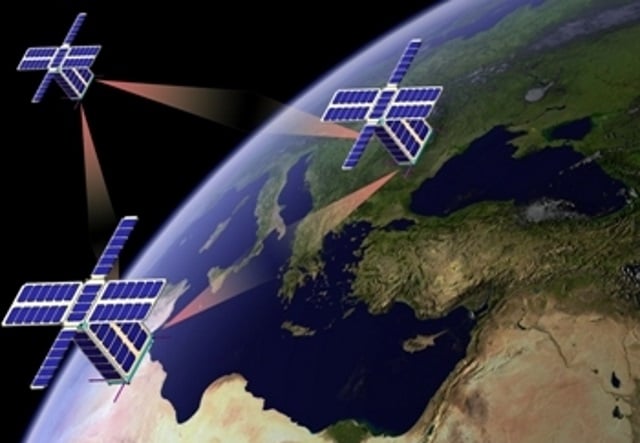Israel will launch three nanosatellites into space in 2018 that will redefine the technology field.
By: United with Israel Staff
Technion and the Israel Space Agency announced Wednesday that in late 2018, a group of three nanosatellites, which will fly in controlled formation, will be launched for the first time into space.
The satellite formation will be launched by the Dutch company Innovative Solutions In Space, which specializes in launching nanosatellites on the Indian PSLV (Polar Satellite Launch Vehicle).
The Adelis-SAMSON Project has been developed in recent years by a team of researchers headed by Prof. Pini Gurfil, Director of the Asher Space Research Institute and member of the Technion Faculty of Aerospace Engineering, and with the support of the Adelis Foundation and the Israel Space Agency.
The objective of the project is to prove that a group of satellites can fly in a controlled formation for one year while orbiting at an altitude of about 600 kilometers.
Groundbreaking Israeli Technology
“Israeli technology is breaking new ground and demonstrating its innovativeness over and over again,” said Science and Technology Minister Ofir Akunis. “We are proud to be part of this flagship project, which represents a significant contribution to the advancement of Israeli aerospace and the training of students in this field.”
The satellites will be used for receiving signals from Earth and calculating the location of the source of transmission for search and rescue operations, remote sensing, and environmental monitoring. The size of each of the satellites is 10 by 20 by 30 cm, about the size of a shoebox, and they weigh a total of around 8 kg. The satellites will be equipped with measuring devices, antennas, computer systems, control systems and navigation devices.
The flight software and algorithms were developed in the Technion Distributed Space Systems Lab.
Israel’s next Step Forward in Space
“Satellite miniaturization together with advanced Israeli technology will enable us to take Israel an important step forward in the field of nanosatellites,” explained Prof. Gurfil. “The degree of innovation here can be compared to switching from a PC to a laptop and then to a mobile phone, which offers far more capabilities than its predecessors.”
“The field of nanosatellites has developed significantly in recent years and the number of launches doubles annually,” said Avi Blasberger, Director General of the Israel Space Agency. “The development and launch costs of such satellites are significantly lower than those of conventional satellites. In the near future, we can expect networks of thousands of nanosatellites that will fly above the Earth and enable high-speed Internet communication at significantly lower cost than today.”
A Blue and White Technology
The satellite’s unique technology is all “blue and white,” made in Israel: Rafael’s krypton gas-based propulsion system will be the first system in the world to power a tiny satellite. The digital receiver was developed by Elta and the guidance control system was developed at Israel Aerospace Industries MABAT plant in cooperation with researchers from Technion.
In addition to the propulsion system, the satellites will accumulate energy through solar panels that will extend from the sides of each satellite and serve as wings that will control the flight formation without the use of fuel, by means of air resistance in the atmosphere.
Each of the nanosatellites will be equipped with a digital signal receiver, one of the most complex receivers ever designed for a nanosatellite. The satellite information processing system and the algorithms that control the formation will be the first of their kind in the world and will support the autonomous operation of several satellites together.
The communications and navigation system will include two GPS receivers to be used for autonomous navigation and a communications system to be used by the three nanosatellites in order to communicate with one another and with the ground station – a significant challenge that has been solved in the current project. A dedicated frequency will be used for sending data to Earth via broadband.
“If we manage to prove in space that flying in formation is possible,” said Prof. Gurfil, “it will be a major boost for the development of small satellites and technologies related to the miniaturization of electronic components, for efficient space processing and for space propulsion systems. The technologies developed in the nanosatellites will contribute to a variety of civilian applications and will promote Israel’s aerospace industry.”
Send 'Warm Winter' Care Packages to Israeli Soldiers - They are Cold!
We are honored to thank the young men and women of the IDF who risk their lives every day to defend the citizens of Israel.
Join us in sending winter care packages and personal notes of support to Israeli soldiers who are out in the cold all day.
Warm up a soldier's heart with essential winter wear including fleece jackets. Keep an entire unit warm by ordering 10 packages... The soldiers truly appreciate your love and concern!
Do You Love Israel? Make a Donation - Show Your Support!
Donate to vital charities that help protect Israeli citizens and inspire millions around the world to support Israel too!
Now more than ever, Israel needs your help to fight and win the war -- including on the battlefield of public opinion.
Antisemitism, anti-Israel bias and boycotts are out of control. Israel's enemies are inciting terror and violence against innocent Israelis and Jews around the world. Help us fight back!
